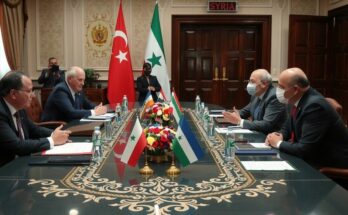Protests erupted globally in response to the assassination of Hassan Nasrallah, Hezbollah’s leader, who was killed in an Israeli airstrike in Beirut. His 32-year leadership positioned Hezbollah as a major political and military force in the region, and his anti-Israeli rhetoric garnered him significant support among Shiite Muslims and other communities. The article underscores the widespread impact of his death, highlighting the mourning it has provoked in various countries.
On Saturday, widespread protests erupted across various countries, including Lebanon, Iran, and the West Bank, in the wake of the assassination of Hassan Nasrallah, the prominent leader of Hezbollah. Mr. Nasrallah was killed on Friday as a result of an Israeli airstrike targeting residential areas near Beirut, which left a significant impact not only on Lebanon but also throughout the Middle East. For over three decades, Mr. Nasrallah steered Hezbollah into becoming a formidable political force and one of the most heavily armed non-state entities worldwide, bolstered by substantial Iranian support. His anti-Israeli stance, reflected in his consistent reference to Israel as “the Zionist entity,” underscored his vision for unified governance, advocating for equality among Muslims, Jews, and Christians in a singular Palestine. His compelling oratory skills garnered him a following among Shiite Muslims, a group that has historically faced marginalization in the Arab world, as he fostered a quasi-state structure within Lebanon that delivered vital social services to his constituents.
The article delves into the significant repercussions resulting from the assassination of Hassan Nasrallah, the leader of Hezbollah, who played a pivotal role in shaping both Lebanese and broader Middle Eastern politics over the past thirty-two years. Nasrallah’s influence ran deep within the Shiite community, enhancing social services and political representation, and galvanizing a strong resistance against Israeli actions in the region. His death is poised to alter the dynamics within Hezbollah and its operations, leading to widespread mourning and protests that echo across borders.
In conclusion, the assassination of Hassan Nasrallah marks a momentous event, eliciting grief and protests across multiple nations. His leadership over Hezbollah has polarized views throughout the region, and his absence raises critical questions regarding Hezbollah’s future and the ongoing Israeli-Palestinian conflict. The widespread demonstrations underscore the significant attachment many have to his legacy and the ongoing tensions in the Middle East.
Original Source: www.nytimes.com




